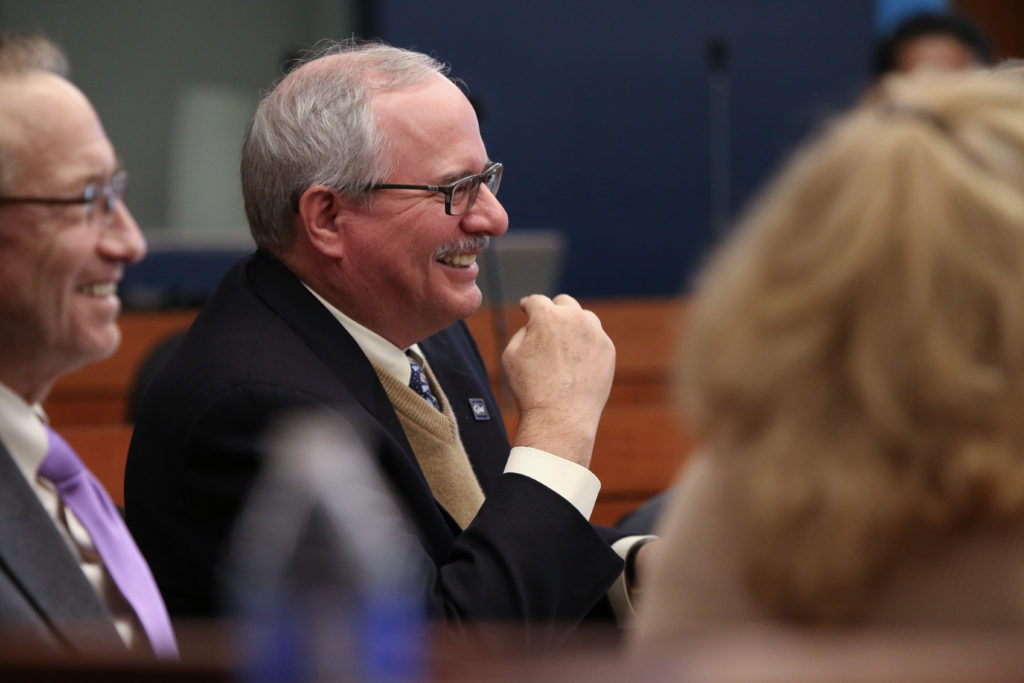University President Thomas LeBlanc will take his first trip abroad as president next month to improve philanthropy and constituent engagement, one of his five top initiatives for GW.
Officials said LeBlanc will travel to London in “late May” to meet with alumni and prospective students living in the United Kingdom. Experts and alumni said LeBlanc should prioritize philanthropy on the trip but could also use the time to discuss the University’s goals and contentious issues on campus, like changing the Colonials nickname.
LeBlanc traveled to six cities last year across the United States, including Philadelphia and New York City, to meet with graduates and discuss his strategic initiatives, which include institutional culture and the student experience. Officials launched a website last year for community members to track administrators’ progress on the initiatives.
“Whenever the president travels, he seeks to meet with alumni, current and/or potential donors and other GW community members, including current students and families, and prospective students and their families,” University spokeswoman Maralee Csellar said in an email.
More than 400 alumni currently live in the United Kingdom and approximately 175 live in the London metropolitan region, she said.
Csellar declined to say how much the trip will cost, adding that officials are still finalizing the trip’s details.
Kathy Bikus, the operations director of the Independent Alumni Association of George Washington, said alumni living abroad can feel a “disconnect” between themselves and the University because of a lack of face-to-face engagement with officials. She said that by showing up, LeBlanc could reconnect those alumni to GW.
The independent alumni association – formerly known as the GW Alumni Association – opened its first branch abroad in London in January to hold networking and meet-and-greet events for alumni living in the city.
“What would be important if I were the president, or what I feel is important for him to do when he travels internationally, is to just connect with the alumni and students to see what some of their issues are, address them, extend that outreach and make sure that they know that they’re supported,” Bikus said.
University presidents in the past have traveled to domestic and international locations to meet with alumni and secure donations. In his last few months in office, former University President Steven Knapp visited Mexico and parts of the Middle East to garner gifts from international donors.
Bikus said LeBlanc should use the trip as an opportunity to discuss controversial issues on campus, like a recent referendum a majority of voting students approved to change the Colonials moniker. She said he and other officials on the trip can gather feedback on the issue through town halls and meetings and take it into consideration when deliberating the topic.
“If they’re just there quick to get a photo op and then they leave, that would be a disservice to the students and alumni,” she said.
Alumni relations experts said international trips help promote the University’s brand worldwide by connecting administrators with prospective foreign students and engaging international alumni who represent GW in their respective countries.
Patrick Auerbach, the associate senior vice president for alumni relations at the University of Southern California, said officials can build more personal relationships between alumni and their alma mater when presidents travel abroad and meet with graduates in-person.
“In our experience, it actually makes a statement that the University is really committed and invested in engaging with its constituents all over the world, whether they’re alumni, parents or donors,” Auerbach said. “So doing international travel, within reason, is something that I think is paramount, especially when an institution really has global aspirations.”
Auerbach said presidential travel can also boost international student applications, advancing institutional efforts to attract and maintain a high international student population. Officials said LeBlanc will try to meet with potential students abroad during his trip.
Administrators are aiming to expand international recruitment in underrepresented countries and increase the international student population as part of its 10-year strategic plan, which ends in 2021.
At his inauguration, LeBlanc said he wanted to increase GW’s global presence, and officials have since started a new scholarship for international students as part of a national campaign to promote diversity in higher education.
Auerbach said presidents’ trips abroad should include events with donors and influencers to raise money and boost GW’s image in other countries. Officials should analyze the trip’s success through qualitative data and quantitative metrics, like event turnout, he said.
“You always have the metrics,” he said. “But it’s also that gut feeling of the president – ‘Was that worth my time?’ – and I would say that odds are, absolutely, it’s going to be worth their time.”
LeBlanc’s trip comes as the University preps for its next capital campaign, which will begin in 2021 in commemoration of the University’s bicentennial year.
Auerbach said USC’s presidents have made efforts to promote the school by traveling overseas at least once a year to meet with the USC community abroad. He said USC officials have already started drafting plans for the school’s incoming president to travel domestically and internationally – and she has not even arrived on campus yet.
Adrianne Denenberg, the senior director of engagement initiatives at Northeastern University’s Office of Alumni Relations, said that while philanthropy is a key goal of university presidents’ international trips, officials should seek to learn more about their alumni’s interests and careers to continue engaging with them beyond their time as a student.
“Once someone has earned a degree or had a Northeastern experience, that hasn’t stopped,” she said. “There’s so much more that happens, obviously, in life. So we want to make sure we stay in touch and then keep up to date on those things, too.”
Meredith Roaten contributed reporting.





